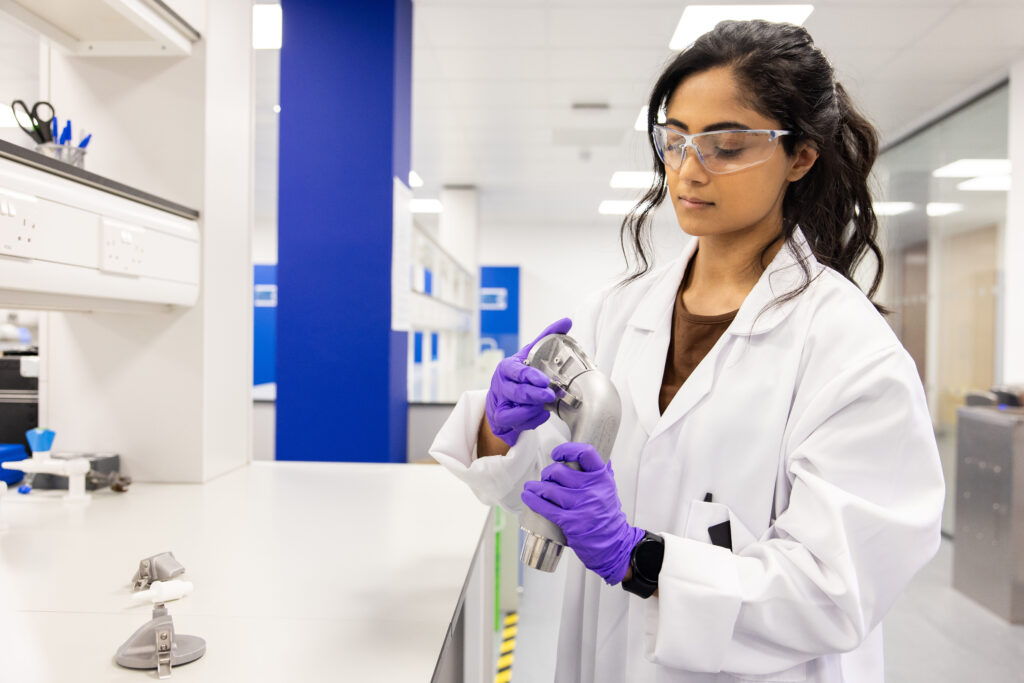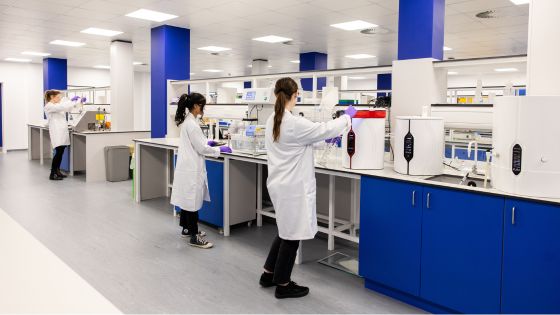For many pharmaceutical companies, the journey from molecule to market is long, complicated, and rife with pitfalls. Companies face a complex, interwoven web of high-stakes decision-making and short timelines that demand precision, speed, and SME expertise at every stage. As a Contract Development and Manufacturing Organization (CDMO), we’ve supported clients with navigating the intricate twists and turns of development, scale-up, and through to market launch.
But one question we hear time and again is: What exactly is the difference between a CDMO, a CRO, and a CMO? It’s a fair question, especially in an industry where acronyms are abundant and the lines between roles are increasingly blurred.
Each plays a vital role in the life sciences ecosystem. But their functions, focus, and value propositions are each distinct, and serve different purposes. Here’s how we see it.
The Role of the CMO: Manufacturing at Scale
Contract Manufacturing Organizations (CMOs) are the engines of pharmaceutical production. Their primary role is to manufacture drug substances and drug products at scale, whilst providing the expertise to ensure that every batch meets stringent quality and regulatory standards. CMOs are typically brought in once a product has progressed through clinical development and is ready for late-stage clinical trials but are often solely brought in to support with commercial launches.

Their expertise lies in operational excellence. CMOs manage everything from raw material sourcing and GMP-compliant production to packaging, labelling, and logistics. They’re built for scale, with the infrastructure and systems needed to produce large volumes of product consistently and reliably. They provide pharmaceutical and biotech companies with a cost-effective method of enlisting highly skilled individuals and cutting-edge equipment to manufacture small and large molecule drugs.
A distinct disadvantage of CMO’s is that they are not usually involved in the earlier stages of development, which include formulation design, process development, and analytical method validation. Instead, they rely on receiving a well-defined process from the sponsor or from a development partner like a CDMO.
These are the situations where challenges can arise from working with a CMO. If the handoff from development to manufacturing is less than seamless, it can lead to delays, inefficiencies, or even costly rework. It can also lead to increased investor scrutiny earlier in the drug development pathway, with funding bodies expecting to see a clear, uninterrupted pathway from initial research to manufacturing. For these reasons, many companies are now looking for more integrated solutions.

The Role of the CRO: Driving Research and Clinical Progress
Contract Research Organizations (CROs) are the scientific and regulatory experts who help bring new therapies to life. Their work begins with a wide range of R&D offerings. Beyond R&D, CROs can design and conduct preclinical studies, manage toxicology programs, and oversee clinical trials across Phases I through IV.
They also play a critical role in regulatory strategy which can span the preparation of Investigational New Drug (IND) applications to managing interactions with regulatory agencies. At this early and crucial stage, CROs help ensure that a product’s development is scientifically sound and compliant with global standards.
CROs are particularly valuable for companies that do not have in-house clinical operations or regulatory teams. They bring deep therapeutic expertise, access to global trial networks, and the ability to manage complex, multi-site studies.
However, CROs typically don’t handle formulation development, process scale-up, or manufacturing as their expertise is concentrated on quality research and extensive clinical trial support. Once a product is ready for clinical supply or commercial production, it is then transferred to a CMO or to a CDMO.
The Role of the CDMO: Integration from Development to Delivery
A contract development and manufacturing organisation (CDMO) combines the capabilities of both CROs and CMOs, but with a focus on development and manufacturing. The role of a CDMO begins where the CRO’s often ends: when a molecule is ready to be formulated, scaled, and produced.
CDMOs work closely with sponsors to develop robust, scalable formulations whilst also designing and validating analytical methods. They optimize manufacturing processes for efficiency, quality, and regulatory compliance and produce clinical trial materials and commercial batches all through one company, and sometimes all on the same site.

This integrated model offers several key advantages. First, it reduces the number of handoffs between partners, which means fewer delays, fewer misunderstandings, and less risk. Second, it allows for greater continuity. The same team that develops your process is the one that scales it and manufactures it so there’s deep institutional knowledge at every step which leads to seamless tech transfer. Thirdly, it accelerates timelines. With fewer transitions and more streamlined workflows, products can move from development to market faster.
The Importance of Choosing Between CRO, CMO, and CDMO
With so many acronyms and a great deal of crossover between a CRO, CMO, and a CDMO, it can initially be challenging to decide which option is right for your molecule. Put simply, if you only require support with clinical research, then choosing a CRO might be the best option. If you only require support with manufacturing, then a CMO might be the best option for you. However, if your project is time-sensitive and requires comprehensive, integrated support, then a CDMO may be the better option.
Download our guide below for more detailed information as to whether your project requires a CRO, CMO or CDMO.
Additional Resources
How to Evaluate CDMO Communication Before You Commit: A Framework for Biotechs
Communication becomes even more critical in today’s regulatory environment. The revision of Annex 1 has tightened sterile manufacturing guidelines, and long lead times make small batch production for early-phase trials harder to secure.
Upperton’s science-led, responsive approach helps clients navigate these complexities.

How to Secure a Successful Outsourcing Agreement
A Contract Development and Manufacturing Organisation (CDMO) contract is a formal agreement between a pharmaceutical company and a CDMO. This contract outlines the terms under which the CDMO will provide services such as drug development, manufacturing, and related support. Establishing a clear and comprehensive CDMO contract is essential for both parties to ensure mutual understanding and successful collaboration.

CDMO Services: Enhancing Drug Development and Manufacturing Efficiency
A Contract Development and Manufacturing organisation (CDMO) provides comprehensive services to pharmaceutical and biotechnology sectors. These services encompass the entire lifecycle of drug development and manufacturing, from initial research through to commercial production. By partnering with a CDMO, you can leverage their expertise and infrastructure, allowing you to focus on your core competencies.
